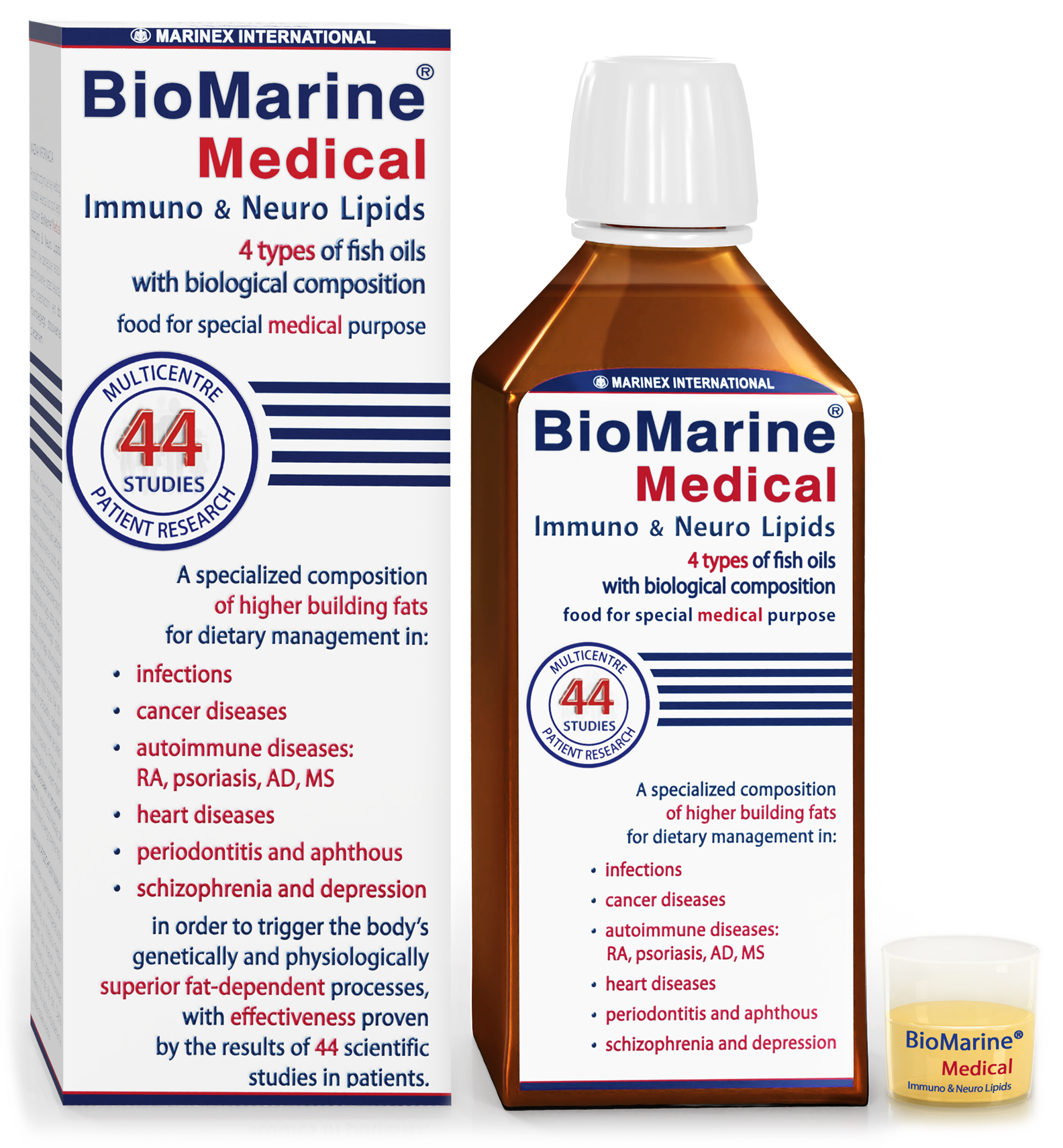
Twoja opinia jest dla nas naprawdę ważna, ponieważ może uratować komuś życie, dlatego prosimy wypełnij tą krótką ankietę.

Twoja opinia jest dla nas naprawdę ważna, ponieważ może uratować komuś życie, dlatego prosimy wypełnij tą krótką ankietę.

Twoja opinia jest dla nas naprawdę ważna, ponieważ może uratować komuś życie, dlatego prosimy wypełnij tą krótką ankietę.
By continuing to actively use the Website, without changing your browser settings, you consented to the storage of cookies in your browser and the processing of personal data collected through them by us and our
Trusted Partners. Find out more or withdraw consent. I accept
statute purchases of Marinex Polska products.
Close X
By continuing to actively use the Website, without changing your browser settings, you consented to the storage of cookies in your browser and the processing of personal data collected through them by us and our
Trusted Partners. Find out more or withdraw consent
. I accept statute purchases of Marinex Polska products.
Close X
The average annual cancer incidence according to 5-year data (2016-2020) is 167,898..
The average annual number of deaths due to cancer was over 100,000 people.
The average annual effectiveness of treatment on this basis can be estimated at 40%.
In 2020, 147,877 people were diagnosed with cancer and 99,870 people died.
- source: National Cancer Registry 2020, Maciejczyk A, Góźdź S, Walewski J. National Oncological Network in the field of solid tumors. PTO NOWWORY 2020 Bulletin; 5: 305–315, Central Statistical Office, Deaths by causes and voivodeships – report 2020.
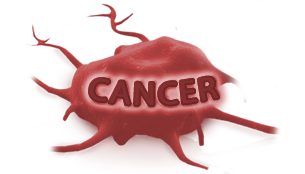
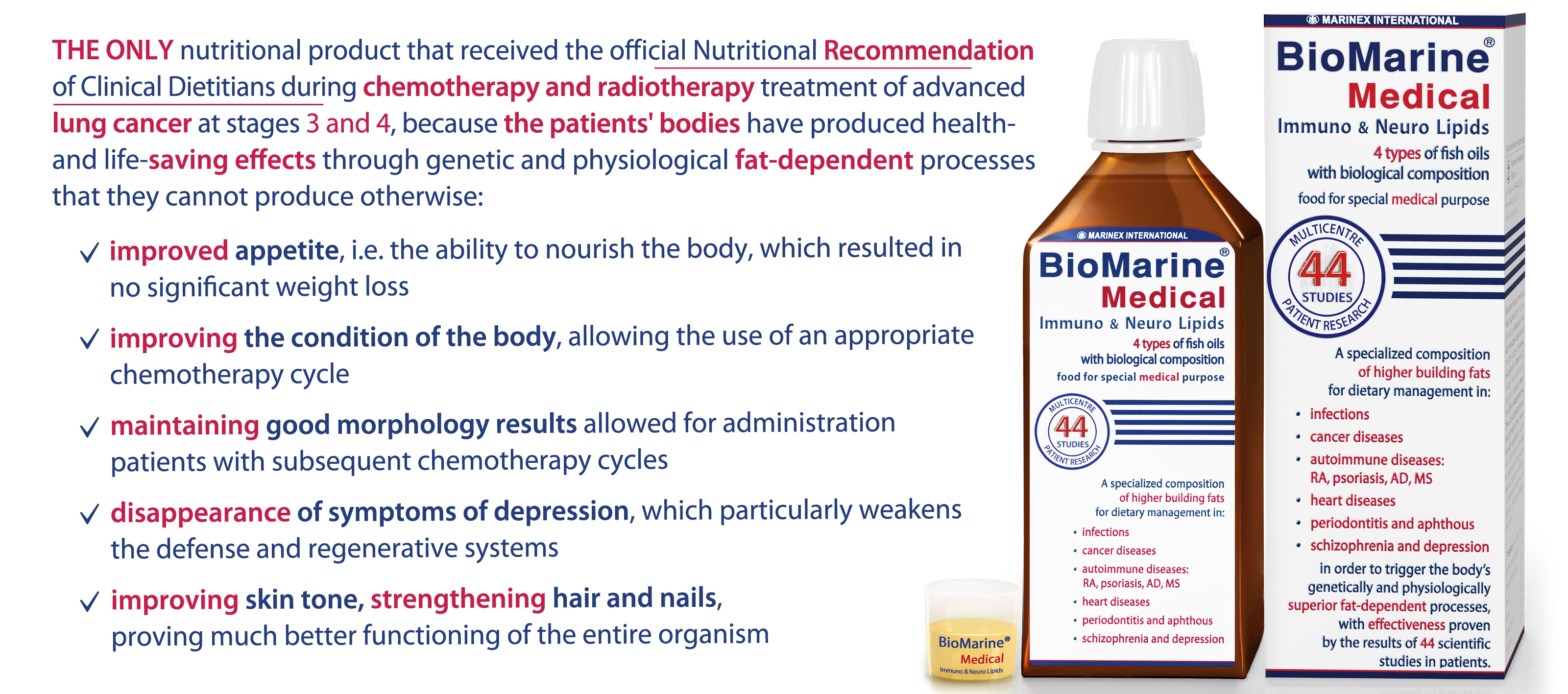
The nutritional intervention was conducted at the Provincial Multidisciplinary Center for Oncology and Traumatology. M. Copernicus University in Łódź by a team of experienced, certified Masters of Clinical Dietetics, working every day with oncology patients.
Patients with advanced lung cancer (stages III a, III b, and IV) intensively nourished their bodies every day for 12 months with a wide composition of higher building fats in the form of 3 types of fish oils - BioMarine®Medical - food for special medical purposes (FSMP):
We ensure that each of the Patient Opinions posted here is authentic and their originals are kept in our company's archives.
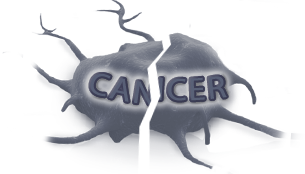
History of a patient suffering from small cell lung cancer.
"Im suffering from small cell lung cancer during the 5th round of chemotherapy. During the entire cycle, I took BioMarine® in liquid form. Studies show that the cancer has largely regressed. I still have good blood results, appetite and generally, apart from a few days after chemotherapy, I feel good."
Wiesław, age: 65 (2020-07-14)
Non-small cell lung cancer. In 2018, chemotherapy and radiotherapy. Stabilization of the disease. Blood test results are normal, increased vitality, no runny nose or colds. I have been using BioMarine®Medical since September 2019 at 35ml/day. I will continue to use it to increase my immunity and improve my overall health throughout the year. Dosage BioMarine®Medical: 35ml/day. Period of use: 11 months
Anna, age: 68 (2019-06-12)
I use BioMarine®Medical to support my body during chemotherapy. I believe that it provides me with quick regeneration before subsequent doses of chemotherapy. Significantly relieves pain and discomfort in the mouth. I intend to use it throughout the entire therapy. Dosage BioMarine®Medical: 40ml/day. Period of use: 5 months.
Zbigniew, age: 66 (2018-11-29)
I use it because of a brain tumor (neuroma). After a week of use, I noticed that the bleeding of the gums had stopped, which I could not cope with, despite following dentists' recommendations. After 36 weeks, I took a break from the treatment and the bleeding returned. I intend to return to regular use of BioMarine®Medical. Dosage BioMarine®Medical: 30 ml/day. Period of use: 36 weeks.
Wiesława, age: 60 (2017-11-27)
In June this year, I was diagnosed with breast cancer. Just 2 days after the diagnosis, I started taking BioMarine®Medical 25-35ml/day. I have had surgery and undergoing chemotherapy. Now I take from 30 to 35 ml. I had rheumatic problems and chronic gastritis. After some time, I took BioMarine®Medical - the pain disappeared. I'm glad because my immunity was very low during chemotherapy and I didn't get any infections (colds, flu). It is thanks to BioMarine®Medical that I use and will continue to use. Dosage BioMarine®Medical: 30-35 ml/day. Period of use: 6 months
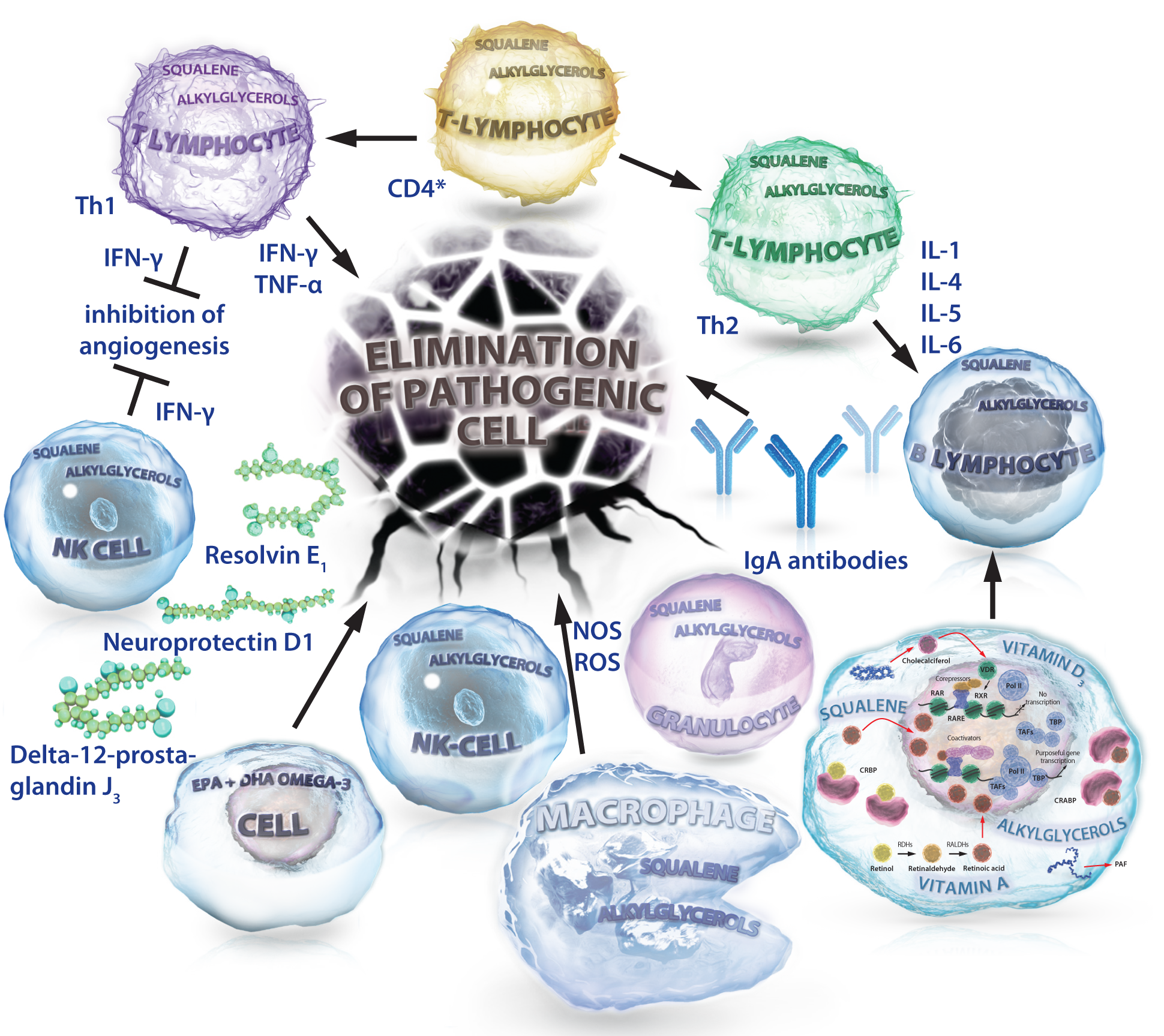
CONCLUSIONS
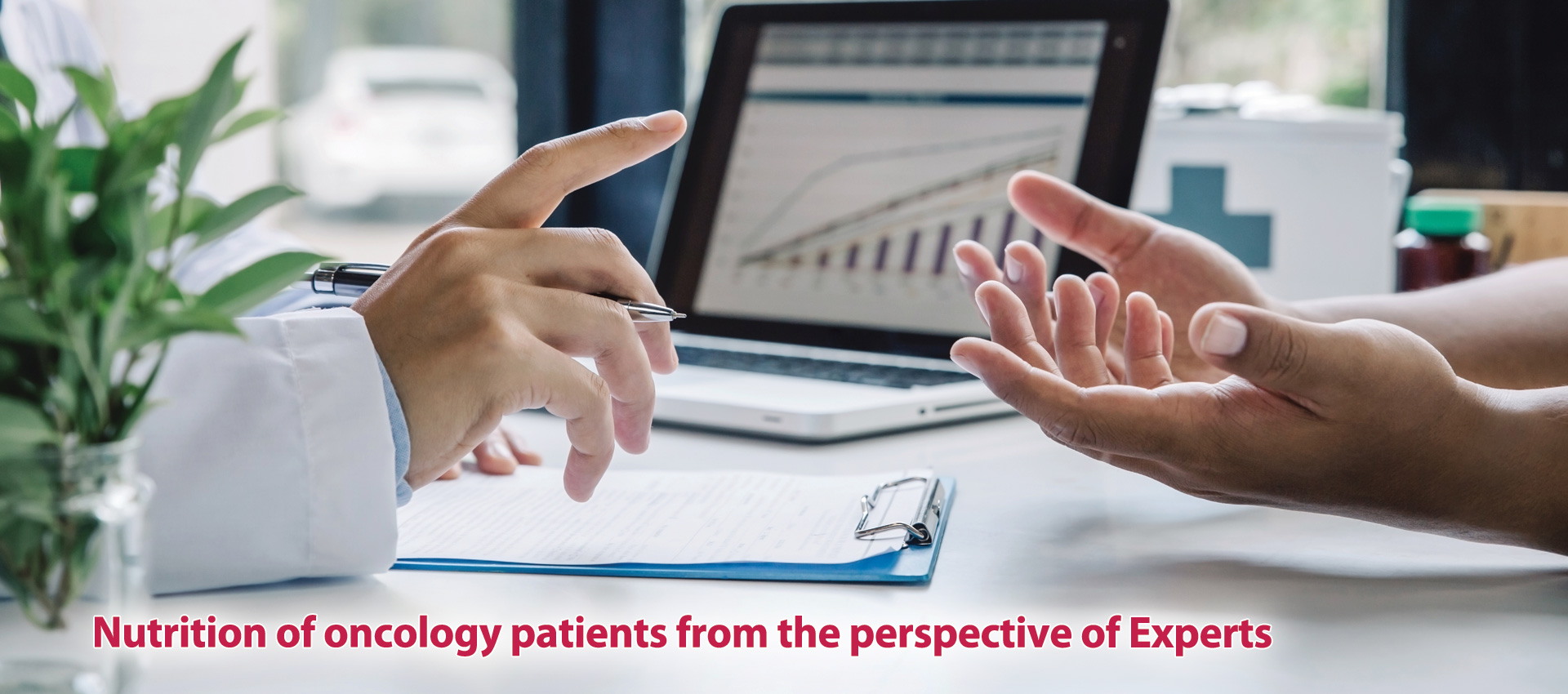
Marinex International has been conducting scientific research on nutrition consistent with the genetic and physiological needs of the Human Body for over 25 years. Each of our studies has clearly proven that providing the body with fats consistent with its genetic and physiological needs is a necessary condition for activating basic defense processes (immunological, anti-inflammatory, hematopoietic) and regenerative processes.
A good sign is that we are increasingly hearing experts' opinions about the indisputable role of nutrition in the fight against disease, especially cancer. It is also emphasized that the current state of this department of health care is at an alarmingly low level and thorough changes are necessary. The nutrition of an oncology patient is particularly important because he or she is fighting not only the disease itself, but also very aggressive, toxic treatment.
Today we quote the following statements:
We are often asked whether every cancer patient should receive nutritional support. How does it look in practice?
„It is worth recalling that in accordance with the applicable guidelines for anticancer therapy, each patient diagnosed with cancer and undergoing oncological treatment should be consulted by a clinical nutrition specialist1” (A. Kapała, MD, Ph).
Why is the nutrition of the body particularly important, especially for cancer patients?
„We must (...) remember that each type of cancer is accompanied by malnutrition. The first non- specific symptom of cancer is unintentional weight loss. And this is also the first symptom of malnutrition22” (PhD P. Matras).
How wide is the scale of this phenomenon?
„About 30 percent of patients admitted to hospital are already malnourished. But what is more alarming is that half of the patients admitted to hospital acquire or worsen malnutrition in hospital conditions2” (Med. Ph.D. P. Matras)).
„More than 30 percent patients have indications for nutritional intervention, and only 20% of these patients received it. What kind of nutrition did the rest of the patients receive? An oral diet of unclear composition and purpose1” (A. Kapała, MD).
Experts say clearly - nutrition is an equal element of patient care, next to chemotherapy or radiotherapy. In practice, however, while scientific research is carried out on new drugs, there is no scientific evidence regarding food. As a result of?
„Conducting research in the field of nutrition is a difficult task. We can compare this with a situation in which researchers were asked to prove that a parachute was needed for a skydiver jumping from an airplane. This is a fact and no one in this field conducts research in which they put two jumpers on board a plane, equip one with a parachute and the other not and tell them to jump. After all, we all know exactly what the outcome of this study would be. It is similar with nutrition1” (A. Kapała, MD).
Still, the existing evidence is irrefutable. Nutrition of cancer patients, carried out in parallel with treatment, is essential.
„Today we already have very strong evidence that clinical nutrition influences the patient's fate and not only improves the quality of his life, but also actually affects its length, which clinicians should constantly be reminded of1” (A. Kapała, MD, PhD).
So why, despite recommendations and recommendations, is nutritional intervention not implemented in practice?
„Doctors have scales that allow them to make (...) assessments, but unfortunately they use them too rarely. We also observe that even if such an assessment is performed, it is only done to properly complete the medical records. After completing the assessment, doctors most often do not draw conclusions and do not undertake interventions that will benefit the patients1” (A. Kapała, MD).
What side effects of chemotherapy does the patient have to take into account?
„All systemic cancer treatment methods carry the risk of side effects. Elderly people constitute a risk group for complications that may significantly affect the course of treatment, its effectiveness and quality of life, as well as intensify existing ailments and comorbidities3” (M. Ekiert, MD).
„Central nervous system complications include: drug-induced brain injury syndrome, posterior inverted encephalopathy, mild to severe necrotizing encephalopathy. However, complications related to the peripheral nervous system are most often: sensory polyneuropathy and mixed sensory-motor polyneuropathy4” (S. Michalak, MD).
„The most common neurological complications are caused by chemotherapy drugs such as cisplatin, cytosine arabinoside, ifosfamide, methotrexate, taxanes and vinca alkaloids4” (S. Michalak, MD).
„Complications such as myelotoxicity accompany chemotherapy. The more severe ones affect up to 30 percent of patients5” (prof. K. Giannopoulos).
„A recent study involving breast cancer patients, the largest population of oncological patients, showed that the risk of [secondary] acute myeloid leukemia increases 2.5 times5” (Prof. K. Giannopoulos).
Prof. Jacek Jassem emphasized that "as an old oncologist" he knew exactly what would happen to him the day after the therapy, in a month, in six months. He expected what the effect of the treatment would be and what the side effects would be. Despite this knowledge, everything he experienced was a completely new experience for him. - It's one thing to know what the symptoms of chemotherapy are, and another thing to experience them - he said.6
Conclusions:
Literature:
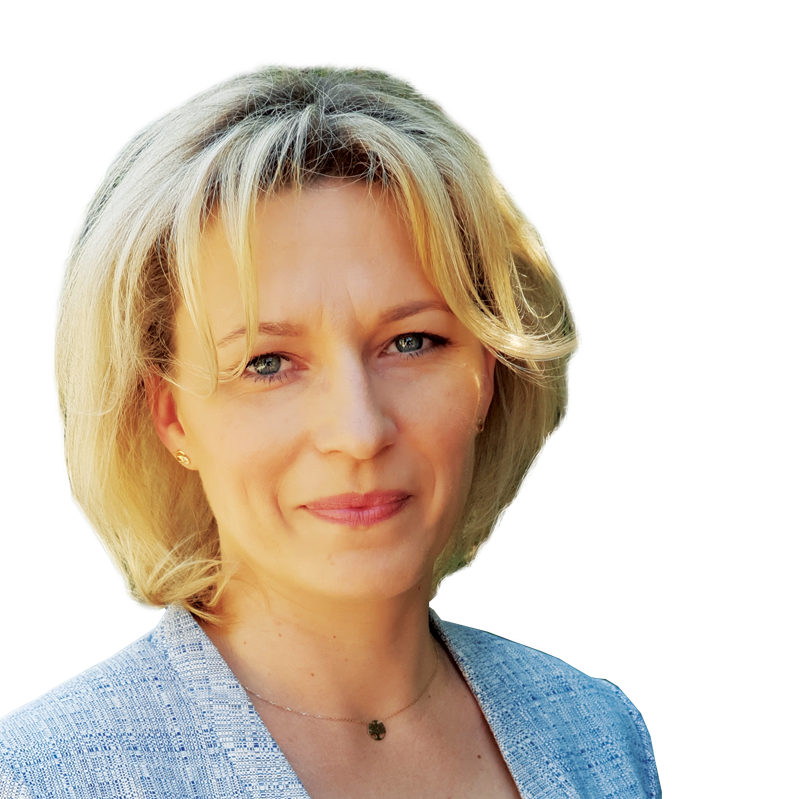
Head of the R&D department, physiologist,
PhD in biology Joanna Zielińska-Tomaszewska
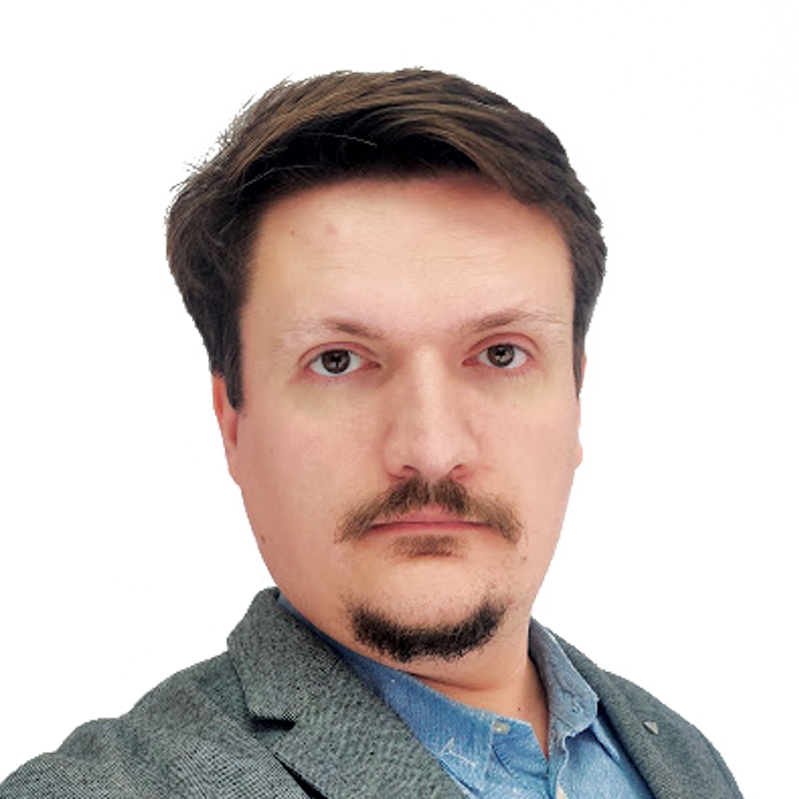
R&D specialist, medical biotechnologist
Tomasz Radzik, MD, PhD

Production manager, dietitian, physiologist
M.A. Konrad Tomaszewski
We invite you for consultations from Mon. to Fri. at hours 12:00-13:30.
![]() +48 602 785 558, +48 789 108 088, +48 42 680 03 33
+48 602 785 558, +48 789 108 088, +48 42 680 03 33
![]() go to the chat »
go to the chat »

